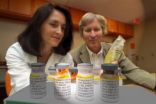(Press-News.org) Cognitive scientists from the University of Rochester have discovered that playing action video games trains people to make the right decisions faster. The researchers found that video game players develop a heightened sensitivity to what is going on around them, and this benefit doesn't just make them better at playing video games, but improves a wide variety of general skills that can help with everyday activities like multitasking, driving, reading small print, keeping track of friends in a crowd, and navigating around town.
In an upcoming study in the journal Current Biology, authors Daphne Bavelier, Alexandre Pouget, and C. Shawn Green report that video games could provide a potent training regimen for speeding up reactions in many types of real-life situations.
Video games have grown in popularity to the point where 68 percent of American households have members that play them, according to a 2009 report by the Entertainment Software Association.
The researchers tested dozens of 18- to 25-year-olds who were not ordinarily video game players. They split the subjects into two groups. One group played 50 hours of the fast-paced action video games "Call of Duty 2" and "Unreal Tournament," and the other group played 50 hours of the slow-moving strategy game "The Sims 2."
After this training period, all of the subjects were asked to make quick decisions in several tasks designed by the researchers. In the tasks, the participants had to look at a screen, analyze what was going on, and answer a simple question about the action in as little time as possible (i.e. whether a clump of erratically moving dots was migrating right or left across the screen on average). In order to make sure the effect wasn't limited to just visual perception, the participants were also asked to complete an analogous task that was purely auditory.
The action game players were up to 25 percent faster at coming to a conclusion and answered just as many questions correctly as their strategy game playing peers.
"It's not the case that the action game players are trigger-happy and less accurate: They are just as accurate and also faster," Bavelier said. "Action game players make more correct decisions per unit time. If you are a surgeon or you are in the middle of a battlefield, that can make all the difference."
The authors' neural simulations shed light on why action gamers have augmented decision making capabilities. People make decisions based on probabilities that they are constantly calculating and refining in their heads, Bavelier explains. The process is called probabilistic inference. The brain continuously accumulates small pieces of visual or auditory information as a person surveys a scene, eventually gathering enough for the person to make what they perceive to be an accurate decision.
"Decisions are never black and white," she said. "The brain is always computing probabilities. As you drive, for instance, you may see a movement on your right, estimate whether you are on a collision course, and based on that probability make a binary decision: brake or don't brake."
Action video game players' brains are more efficient collectors of visual and auditory information, and therefore arrive at the necessary threshold of information they need to make a decision much faster than non gamers, the researchers found.
The new study builds on previous work by Bavelier and colleagues that showed that video games improve vision by making players more sensitive to slightly different shades of color.
INFORMATION:
About the University of Rochester
The University of Rochester (www.rochester.edu) is one of the nation's leading private universities. Located in Rochester, N.Y., the University gives students exceptional opportunities for interdisciplinary study and close collaboration with faculty through its unique cluster-based curriculum. Its College, School of Arts and Sciences, and Hajim School of Engineering and Applied Sciences are complemented by the Eastman School of Music, Simon School of Business, Warner School of Education, Laboratory for Laser Energetics, Schools of Medicine and Nursing, and the Memorial Art Gallery.
Video games lead to faster decisions that are no less accurate
Study suggests that video games could be training tool for quicker reactions
2010-09-13
ELSE PRESS RELEASES FROM THIS DATE:
New study: Serious gaps in medical journals' disclosure of physician relationships with industry
2010-09-13
(New York, NY) Nearly half the surgeons who made at least $1 million in payments from orthopedic device companies did not have that relationship published in their scientific articles, according to a study released today in the on-line edition of the Archives of Internal Medicine. The study shows that readers are not being adequately informed about conflicts of interest even when the funds involved are significant.
The study, conducted by researchers at the New York-based Institute on Medicine as a Profession (IMAP), is the first of its kind to use company records ...
NYU Langone scientists find key pathway implicated in progression of childhood cancer
2010-09-13
New York (September 13, 2010) - According to a new study a protein crucial for the immune response appears to be a key player in the progression of a devastating form of childhood leukemia called T-cell acute lymphoblastic leukemia (T-ALL). Suppressing the activity of the protein kills the leukemic cells, the study shows, opening a potential avenue to new drugs that could prevent progression of the disease.
Led by Iannis Aifantis, PhD, associate professor of pathology and director of the Cancer Stem Cell Program at the NYU Cancer Institute at NYU Langone Medical Center, ...
Lung cancer culprit could offer target for therapy, UT Southwestern researchers report
2010-09-13
DALLAS – Sept. 13, 2010 – A tiny molecule that spurs the progression of non-small-cell lung cancer could become a player in fighting the disease, say researchers at UT Southwestern Medical Center, who published a study on how the molecule behaves in mice in the Sept. 14 issue of Cancer Cell.
Scientists have known that the molecule microRNA-21, or miR-21, is present in overabundant quantities in human tumors, including non-small-cell lung cancer (NSCLC). Until now, however, it was unclear whether miR-21 contributed to the development of lung cancer, or whether it was simply ...
UC Davis scientists find link between arthritis pain reliever and cardiovascular events
2010-09-13
DAVIS--A research team from the University of California, Davis and Peking University, China, has discovered a novel mechanism as to why the long-term, high-dosage use of the well-known arthritis pain medication, Vioxx, led to heart attacks and strokes. Their groundbreaking research may pave the way for a safer drug for millions of arthritis patients who suffer acute and chronic pain.
Using metabolomic profiling to analyze murine (rodent) plasma, the scientists discovered that Vioxx causes a dramatic increase in a regulatory lipid that could be a major contributor to ...
First-of-its-kind study shows supervised injection facilities can help people quit drugs
2010-09-13
A study led by researchers at the BC Centre for Excellence in HIV/AIDS (BC-CfE) at St. Paul's Hospital and the University of British Columbia has found that supervised injection facilities such as Vancouver's Insite connect clients with addiction treatment, which in turn resulted in greater likelihood of stopping injection drug use for at least six months.
The study, recently published in the peer-reviewed journal Drug and Alcohol Dependence, is the first ever to examine the link between a supervised injection facility and injection cessation.
"Extensive research has ...
Biofuel from inedible plant material easier to produce following enzyme discovery
2010-09-13
Researchers funded by the Biotechnology and Biological Sciences Research Council
(BBSRC) have discovered key plant enzymes that normally make the energy stored in wood, straw, and other non-edible parts of plants difficult to extract. The findings, published today in Proceedings of the National Academy of Sciences, can be used to improve the viability of sustainable biofuels that do not adversely affect the food chain.
The team based at the University of Cambridge, and now part of the BBSRC Sustainable Bioenergy Centre (BSBEC), has identified and studied the genes for ...
Antibiotic appears safe for stroke patients and good companion for tPA
2010-09-13
An antibiotic appears to be a safe treatment for stroke and a good companion therapy for tPA, the clot buster that is currently the only FDA-approved drug therapy, researchers report.
A safety study in 60 stroke patients in Georgia, Kentucky and Oregon found the drug well tolerated even at three-and-one-half times the dose currently used for conditions such as rheumatoid arthritis, according to a research team led by the Medical College of Georgia and the University of Georgia.
"It's cheap, safe, well tolerated, easy to administer and can be given with tPA," said Dr. ...
Measures to prevent the loss of foreign investment in Spain
2010-09-13
The theory holds that one of the best ways to attract foreign capital consists in the adoption of a reduced level of taxes in certain cases, and above all, in the provision of legal certainty. This aim of attracting foreign investment inspired the measures for the the Entidades Tenedoras de Valores Extranjeros (ETVE) or Spanish holding companies, adopted in Spain in the late 1990's and which led to the establishment of these companies in Spain by multinational companies. However, things are changing, according the head of the UC3M Research Group of Taxation and Finance ...
Public handwashing takes a hike
2010-09-13
Mom's advice about cleaning your hands may finally be starting to get through.
In the latest observational study sponsored by the American Society for Microbiology and the American Cleaning Institute® (formerly The Soap and Detergent Association), 85% of adults washed their hands in public restrooms, compared with 77% in 2007. The 85% total was actually the highest observed since these studies began in 1996. The results were announced at the Interscience Conference on Antimicrobial Agents and Chemotherapy, an infectious disease meeting sponsored by the American Society ...
Can the kids be all right if they are gay too?
2010-09-13
Albany, NY—September 13, 2010— New research on the children of LGBTQ people (lesbian, gay, bisexual, transgender and queer) has unequivocally revealed that they are not only psychologically healthy, but often appear to exhibit better social and academic adjustment and a significantly lower incidence of social problems than their peers. A new article published in the journal Family Process critically examines this research, and how it impacts LGBTQ families.
According to Family Therapist and Social Work professor, Arlene Istar Lev these excellent outcomes might be masking ...
LAST 30 PRESS RELEASES:
Kidney cancer study finds belzutifan plus pembrolizumab post-surgery helps patients at high risk for relapse stay cancer-free longer
Alkali cation effects in electrochemical carbon dioxide reduction
Test platforms for charging wireless cars now fit on a bench
$3 million NIH grant funds national study of Medicare Advantage’s benefit expansion into social supports
Amplified Sciences achieves CAP accreditation for cutting-edge diagnostic lab
Fred Hutch announces 12 recipients of the annual Harold M. Weintraub Graduate Student Award
Native forest litter helps rebuild soil life in post-mining landscapes
Mountain soils in arid regions may emit more greenhouse gas as climate shifts, new study finds
Pairing biochar with other soil amendments could unlock stronger gains in soil health
Why do we get a skip in our step when we’re happy? Thank dopamine
UC Irvine scientists uncover cellular mechanism behind muscle repair
Platform to map living brain noninvasively takes next big step
Stress-testing the Cascadia Subduction Zone reveals variability that could impact how earthquakes spread
We may be underestimating the true carbon cost of northern wildfires
Blood test predicts which bladder cancer patients may safely skip surgery
Kennesaw State's Vijay Anand honored as National Academy of Inventors Senior Member
Recovery from whaling reveals the role of age in Humpback reproduction
Can the canny tick help prevent disease like MS and cancer?
Newcomer children show lower rates of emergency department use for non‑urgent conditions, study finds
Cognitive and neuropsychiatric function in former American football players
From trash to climate tech: rubber gloves find new life as carbon capturers materials
A step towards needed treatments for hantaviruses in new molecular map
Boys are more motivated, while girls are more compassionate?
Study identifies opposing roles for IL6 and IL6R in long-term mortality
AI accurately spots medical disorder from privacy-conscious hand images
Transient Pauli blocking for broadband ultrafast optical switching
Political polarization can spur CO2 emissions, stymie climate action
Researchers develop new strategy for improving inverted perovskite solar cells
Yes! The role of YAP and CTGF as potential therapeutic targets for preventing severe liver disease
Pancreatic cancer may begin hiding from the immune system earlier than we thought
[Press-News.org] Video games lead to faster decisions that are no less accurateStudy suggests that video games could be training tool for quicker reactions


